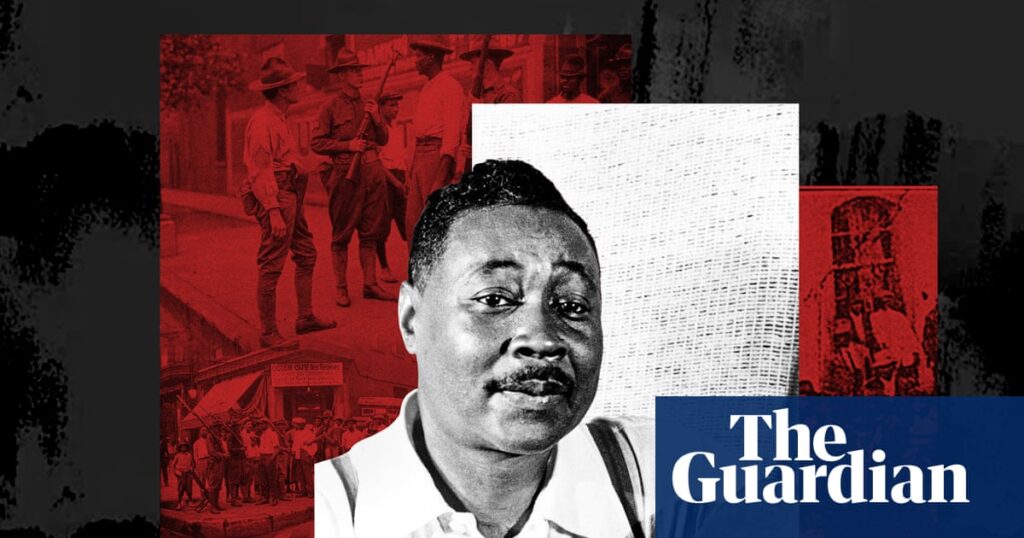
In the summer of 1919, as racial violence swept across the United States in what became known as the Red Summer, Jamaican immigrant Claude McKay found himself working as a dining car waiter on the Pennsylvania railroad. Fearful of the escalating tensions, he carried a revolver hidden in his starched white jacket. This period of unrest, marked by riots and lynchings, deeply affected McKay and fueled his passion for writing.
McKay, then a 28-year-old aspiring poet, was shaken by the racial hatred he witnessed. “It was the first time I had ever come face to face with such manifest, implacable hate of my race, and my feelings were indescribable,” he later reflected. This profound experience inspired him to write the powerful sonnet If We Must Die, which was published in the leftist publication The Liberator. The poem became a rallying cry for Black Americans, earning McKay recognition as a significant literary talent.
From Harlem to London: A Journey of Radicalism
By the end of that turbulent summer, McKay had left his job on the railroad and joined the Industrial Workers of the World (IWW) in Manhattan. However, pressure from the Justice Department, which viewed his poem as inflammatory, led to his departure from the U.S. in September 1919. He traveled to the UK, drawn by an offer from literary admirers and a desire to visit his “true cultural homeland.”
Upon arriving in London, McKay discovered that racial violence was not confined to the United States. Riots had erupted in cities like London, Liverpool, and Cardiff, driven by competition for jobs and housing, as well as white hostility towards mixed relationships. Historian Jacqueline Jenkinson notes that the UK riots of 1919 emerged from a climate of xenophobia and postwar grievances.
In London, McKay sought a literary scene akin to Harlem’s vibrant community. He found solace in a club for non-white soldiers in Drury Lane, where he connected with fellow intellectuals and activists. It was here that he met Sylvia Pankhurst, editor of the Workers’ Dreadnought, a leading publication of the radical left.
Collaboration with Sylvia Pankhurst
Pankhurst, known for her suffragette activism and radical Marxism, offered McKay a position as the paper’s labor correspondent. McKay eagerly accepted, covering strikes, trade union meetings, and the volatile situation on London’s docks. His writings provided a Black perspective at a time when people of color were often demonized in mainstream media.
McKay’s work at the Dreadnought was prolific, encompassing essays, articles, and militant poems. He often wrote under pseudonyms to avoid scrutiny from authorities, as the activities of the Workers’ Socialist Federation were closely monitored by Scotland Yard. His writings highlighted the struggles of Black workers and critiqued the British imperial project.
“The British empire is the greatest obstacle to international socialism, and any of its subjugated parts succeeding in breaking away from it would be helping the cause of world communism.”
Confronting Racial Prejudices
In April 1920, McKay responded to inflammatory articles in the Daily Herald that depicted Black French troops as “primitive African barbarians.” His letter, published in the Dreadnought, challenged these racist narratives and drew attention to the broader implications of such propaganda. He warned that it could incite further racial violence in British cities.
McKay’s activism extended beyond journalism. He was actively involved in distributing the Dreadnought at workers’ rallies and engaged with various leftist groups in London. His work did not go unnoticed by British intelligence, which closely monitored his activities.
Legacy and Impact
Fearing arrest, McKay left England in early 1921 and returned to the U.S., where he continued his literary career as associate editor of The Liberator. His experiences in London and his collaboration with Pankhurst had a lasting impact on his writing and activism.
McKay’s most famous collection of poetry, Harlem Shadows, was published in 1922, solidifying his place as a leading figure in the Harlem Renaissance. Despite facing persecution for his radical views, McKay remained committed to highlighting the struggles of Black workers and advocating for social change.
In his later years, McKay grew disillusioned with political ideologies but continued to write, offering unparalleled insights into multicultural communities and the challenges of poverty and colonialism. His legacy endures as a testament to the power of the pen in challenging injustice and advocating for equality.






